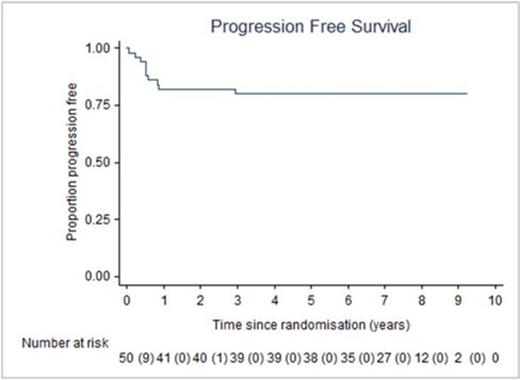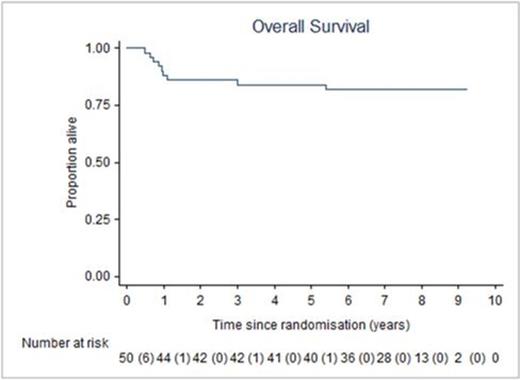Abstract
Introduction: Primary Mediastinal B-cell Lymphoma (PMBL) is a rare subtype of diffuse large B-cell lymphoma (DLBCL) comprising approximately 10% of cases. Studies in the pre-rituximab (R) era suggested a benefit for dose intensified regimens such as V/MACOP-B over cyclophosphamide, doxorubicin, vincristine and prednisolone (CHOP). However no prospective studies comparing dose intensified regimens with R-CHOP have been performed in the rituximab era and controversy exists regarding the current optimal induction chemotherapy. R-CHOP +/- involved field radiotherapy (IFRT) is the most commonly used regimen worldwide with reported 5-yr relapse free and overall survival rates of 68-81% and 79-91% respectively; but with the exception of the MInT trial (which evaluated young patients with PMBL aged ≤60 years with an age-adjusted International Prognostic Index of 0-1), the evidence for R-CHOP in PMBL comes from retrospective studies. The aim of this analysis was to evaluate the outcomes for R-CHOP treated PMBL patients within the UK NCRI R-CHOP 14 v 21 prospective trial.
Methods: The phase III randomised UK R-CHOP-14 vs 21 trial assessed R-CHOP given 2 weekly versus 3 weekly in 1080 DLBCL patients aged ≥ 18years who were enrolled from 2005-2008. We previously reported that R-CHOP-14 was not superior to R-CHOP-21 for overall survival (OS), progression free survival (PFS), response rate or safety (Cunningham D et al, Lancet May 2013). Patients with PMBL were not excluded from participation and we identified cases by searching the trial database for patients with a mediastinal mass (≥5cm) who also fulfilled the WHO 2008 clinical criteria for sites of involvement (absence of disease involvement outside of the thorax +/- cervical / supraclavicular lymph node involvement). Response was assessed according to the IWG 1999 criteria. PFS and OS were calculated from date of randomisation and analysed using Kaplan-Meier methods.
Results: 50/1,080 (4.6%) patients from the R-CHOP 14 v 21 study database met the WHO 2008 criteria for PMBL and were included in this analysis, with a median follow-up of 7.3 years. The median age at diagnosis was 38.5 years (range 22-78 years). 50% (n=25) of the patients were female. All patients had stage I (n=18, 36%) or II (n=32, 64%) disease. The median mediastinal mass diameter was 11.1cm (range 6-23cm) and 70% (n=35) of patients had a mediastinal mass ≥10cm. 28 (56%) and 22 (44%) patients were treated with R-CHOP-21 and R-CHOP-14 respectively. On completion of R-CHOP chemotherapy CT response was complete (CR) in 43% (n=21), partial (PR) in 49% (n=24), stable disease (SD) in 2% (n=1) and progressive disease (PD) in 6% (n=3), one patient was non-evaluable. IFRT was administered to 58% of patients (n=29). For all patients (n=50) the 5-year PFS was 80.0% (95% CI 68.7-91.1) and 5-year OS was 84.0% (95% CI 73.8-94.2), as shown in Figures 1 and 2 respectively. 5/10 PFS and 4/9 OS events occurred in patients who had received consolidation IFRT post R-CHOP. Where disease progression occurred 9/10 events occurred within the first-year of follow-up.
Conclusion: Our data confirms the efficacy of R-CHOP in the management of PMBL and is a benchmark for future studies in PMBL. This is to our knowledge, the largest reported cohort of R-CHOP treated PMBL patients from a prospective trial. The strength of this analysis lies in the long duration of follow-up, the strict selection of patients according to the WHO 2008 criteria and the inclusion of all patients ≥ 18 years without an upper age limit. In line with previous studies we found that disease progression in PMBL occurs early and late relapses are rare. Over half of the patients in our analysis (58%) received consolidation IFRT following R-CHOP. Response assessment by FDG-PET-CT on completion of R-CHOP was not mandated by the study protocol and whether IFRT could have been avoided for PET negative patients in our cohort is unknown. The currently accruing IELSG 37 prospective trial will help to address this important clinical question in PMBL. Excellent results have recently been reported with the combination of DA-EPOCH-R in PMBL, but the efficacy of such dose-intensified regimens in comparison to R-CHOP needs to be evaluated in prospective randomised studies.
Cunningham:Amgen: Research Funding; Astra Zeneca: Research Funding; Merck Serono: Research Funding; Celgene: Research Funding; Sanofi: Research Funding; Merrimack: Research Funding; Medimmune: Research Funding; Bayer HealthCare Pharmaceuticals: Research Funding. Pocock:Janssen: Honoraria.
Author notes
Asterisk with author names denotes non-ASH members.



This feature is available to Subscribers Only
Sign In or Create an Account Close Modal